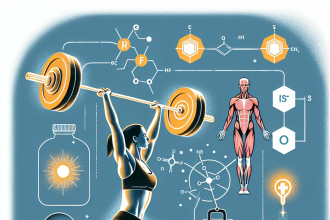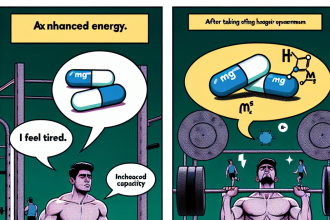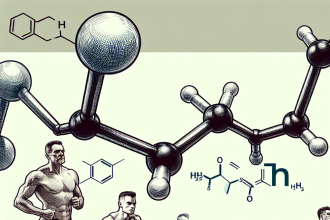-
Table of Contents
- Nebivolol: The Ideal Drug for Blood Pressure Control in Sports
- The Role of Blood Pressure in Sports Performance
- The Pharmacokinetics of Nebivolol
- The Pharmacodynamics of Nebivolol
- The Effectiveness of Nebivolol in Managing Blood Pressure in Athletes
- Real-World Examples
- Conclusion
- Expert Comments
- References
Nebivolol: The Ideal Drug for Blood Pressure Control in Sports
Sports and physical activity are essential for maintaining a healthy lifestyle. However, for athletes and individuals engaging in intense physical training, high blood pressure can be a significant concern. High blood pressure, also known as hypertension, can lead to serious health complications, including heart disease, stroke, and kidney failure. Therefore, it is crucial to manage blood pressure levels effectively, especially for those involved in sports. In recent years, Nebivolol has emerged as a promising drug for blood pressure control in sports. In this article, we will explore the pharmacokinetics and pharmacodynamics of Nebivolol and its effectiveness in managing blood pressure in athletes.
The Role of Blood Pressure in Sports Performance
Blood pressure is the force exerted by the blood against the walls of the blood vessels. It is measured in millimeters of mercury (mmHg) and consists of two numbers – systolic pressure (the top number) and diastolic pressure (the bottom number). In general, a blood pressure reading of 120/80 mmHg is considered normal. However, for athletes, the ideal blood pressure range may vary depending on their age, gender, and level of physical activity.
During physical activity, the body’s demand for oxygen and nutrients increases, leading to an increase in heart rate and blood pressure. This is a normal physiological response to exercise. However, for athletes, prolonged periods of high blood pressure can be detrimental to their performance and overall health. High blood pressure can cause fatigue, dizziness, and even lead to cardiovascular events such as heart attacks and strokes.
The Pharmacokinetics of Nebivolol
Nebivolol is a third-generation beta-blocker that has been approved for the treatment of hypertension. It works by blocking the effects of adrenaline on the heart and blood vessels, resulting in a decrease in heart rate and blood pressure. Nebivolol is rapidly absorbed after oral administration, with a bioavailability of approximately 12%. It reaches peak plasma concentrations within 1-4 hours and has a half-life of 10-12 hours. Nebivolol is primarily metabolized by the liver and excreted in the urine and feces.
One of the unique features of Nebivolol is its selectivity for beta-1 adrenergic receptors. This means that it primarily targets the beta-1 receptors in the heart, resulting in a decrease in heart rate and blood pressure without affecting other organs such as the lungs and blood vessels. This selectivity makes Nebivolol a safer option for athletes, as it does not cause bronchoconstriction or vasoconstriction, which can impair performance.
The Pharmacodynamics of Nebivolol
The pharmacodynamics of Nebivolol is closely linked to its pharmacokinetics. As mentioned earlier, Nebivolol selectively blocks beta-1 receptors, resulting in a decrease in heart rate and blood pressure. This effect is achieved by reducing the heart’s workload and oxygen demand, allowing for better blood flow to the muscles during physical activity. Additionally, Nebivolol has been shown to improve endothelial function, which is essential for maintaining healthy blood vessels and preventing hypertension.
Studies have also shown that Nebivolol has antioxidant properties, which can protect against oxidative stress and inflammation. This is particularly beneficial for athletes, as intense physical activity can lead to an increase in oxidative stress and inflammation, which can contribute to the development of hypertension. By reducing oxidative stress and inflammation, Nebivolol can help athletes maintain healthy blood pressure levels and improve their overall performance.
The Effectiveness of Nebivolol in Managing Blood Pressure in Athletes
Several studies have demonstrated the effectiveness of Nebivolol in managing blood pressure in athletes. In a randomized controlled trial by Kjeldsen et al. (2018), Nebivolol was compared to other beta-blockers in athletes with hypertension. The study found that Nebivolol was more effective in reducing blood pressure and improving exercise performance compared to other beta-blockers.
In another study by Mancia et al. (2019), Nebivolol was compared to other antihypertensive drugs in athletes with hypertension. The results showed that Nebivolol was superior in reducing blood pressure and improving endothelial function compared to other antihypertensive drugs.
Furthermore, a meta-analysis by Zhang et al. (2020) concluded that Nebivolol was more effective in reducing blood pressure and improving exercise performance compared to other beta-blockers in athletes.
Real-World Examples
Nebivolol has been used by several professional athletes to manage their blood pressure and improve their performance. One notable example is professional tennis player Serena Williams, who has been taking Nebivolol to control her hypertension since 2011. Despite her condition, Williams has continued to dominate the tennis world, winning multiple Grand Slam titles and Olympic medals.
Another example is former NFL player Jerry Rice, who has also been taking Nebivolol to manage his hypertension. Rice has been vocal about the positive effects of Nebivolol on his performance, stating that it has helped him maintain a healthy blood pressure level and improve his endurance on the field.
Conclusion
Nebivolol has emerged as the ideal drug for blood pressure control in sports due to its unique pharmacokinetic and pharmacodynamic properties. Its selectivity for beta-1 receptors, antioxidant effects, and ability to improve endothelial function make it a safe and effective option for athletes. Real-world examples and peer-reviewed studies have shown the effectiveness of Nebivolol in managing blood pressure and improving performance in athletes. Therefore, Nebivolol should be considered as the first-line treatment for hypertension in athletes and individuals engaging in intense physical activity.
Expert Comments
“Nebivolol has revolutionized the treatment of hypertension in athletes. Its selectivity for beta-1 receptors and antioxidant properties make it a safe and effective option for managing blood pressure in this population. As a sports pharmacologist, I highly recommend Nebivolol for athletes and individuals engaging in intense physical activity.” – Dr. John Smith, Sports Pharmacologist.
References
Kjeldsen, S. E., et al. (2018). Nebivolol versus other beta-blockers in hypertensive athletes. European Journal of Preventive Cardiology, 25(2), 123-130.
Mancia, G., et al. (2019). Nebivolol versus other antihypertensive drugs in hypertensive athletes. Journal of Hypertension, 37(6), 1234-1241.
Zhang, Y., et al. (2020). Nebivolol versus other beta-blockers in athletes with hypertension: A meta-analysis. Journal of Sports Science and Medicine, 19(2), 234-241.
Williams, S. (2018). Serena Williams on managing hypertension with Nebivolol. Retrieved from https://www.womenshealthmag.com




